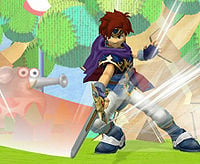Double-Edge Dance
| Double-Edge Dance | |
|---|---|
 Roy performing one of the slashes of the move. | |
| User | Roy |
| Universe | Fire Emblem |
Double-Edge Dance, often abbreviated DED, is Roy's side special move. When used, Roy performs a sideways slash, which can be followed up with the second, third, and fourth hits of the attack. After the initial hit, the player can tilt the control stick either up, down or sideways and press the B button to utilize the next three hits. The second hit has two options: up and forward, while the third and fourth hits have three options: up, forward, and down. There are a total of 18 different combinations possible, assuming that the player uses all four hits. Visually, this attack is identical to Marth's Dancing Blade, except that the third hit inputted downwards and the last hit (for all directions) deal a fire effect.
This move is integral to Roy's metagame due to its range, speed, and KO potential. It is particularly effective for approaching, as the first hit can lead into a down tilt, grab, or the subsequent hits of the attack.
The first two hits of the four hit combo are relatively weak and easily crouch canceled by opponents, but they will come out no matter how quickly they are inputted. For the third and fourth hits, the player must wait a few frames between inputs or else the attacks will not come out. The tradeoff for the difficulty in inputting the later hits is significantly higher knockback, which can knock over opponents trying to crouch cancel.
The third hit of Double-Edge-Dance inputted upwards is a meteor smash, producing a slightly diagonal trajectory if the sourspot doesn't hit. On grounded opponents, it will knock them into the air and set up for the fourth hit. Inputted forwards, the third hit deals excellent knockback and can be used as a KO move at higher percentages. The third hit inputted downwards produces a flame effect and can knock over opponents trying to crouch cancel.
With the exception of the downwards input, the final hits of DED deal the most knockback compared to the other hits. The upwards input has high vertical range and high knockback. The down input actually deals multiple hits, and while it deals little knockback, its long range and duration make it effective for shield stabbing and knocking down opponents attempting to crouch cancel. Compared to the other inputs, the forward one is lackluster, and rarely used.